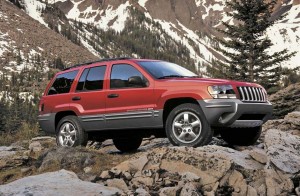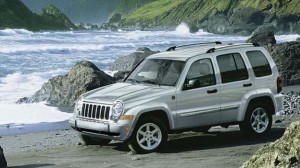In a sudden and unexpected shift, Chrysler has decided to acquiesce to a demand by the National Highway Traffic Safety Administration and recall 2.7 million older Jeeps federal regulators claim are at risk of catching fire in rear-end collisions.
The maker has issued a statement advising that it “will conduct a voluntary campaign with respect to the vehicles in question that, in addition to a visual inspection of the vehicle will, if necessary, provide an upgrade to the rear structure of the vehicle to better manage crash forces in low-speed impacts.”
As recently as this morning, Chrysler officials were signaling that they would reject the recall request even if that meant squaring up with NHTSA in court. But a senior Chrysler source acknowledged that the maker came to recognize it might be able to win that battle yet still could lose in the court of public opinion.
“The morning (news reports) were accurate but (the decision) wasn’t finalized,” said the Chrysler veteran, adding that the maker “absolutely” recognized that public sentiment seemed to be shifting against the maker. “Even if all the data shows we’re right…we’re impacted by concerns about public opinion. This is an iconic brand and we have to consider this from a reputation standpoint.”
(Opinion: Chrysler faced big risk rejecting recall. Click Here for the story.)
NHTSA set the showdown in motion earlier this month when it declared that older Jeep Grand Cherokee and Jeep Liberty models with gas tanks mounted behind their rear axles are at risk of catching fire in rear-end collisions. The government claims 51 people have been killed in fiery crashes resulting from what it describes as a design defect.
For its part, Chrysler claims that the Jeeps met all federal safety standards when they were produced – the Grand Cherokees targeted by NHTSA were sold between 1993 and 2004, while the Jeep Liberty SUVs were sold from 2002 to 2007.
In its statement, Chrysler continued to insist that the two Jeep models are getting a bum rap despite its decision to order a recall.
“Chrysler Group’s analysis of the data confirms that these vehicles are not defective and are among the safest in the peer group,” the maker declared. “Nonetheless, Chrysler Group recognizes that this matter has raised concerns for its customers and wants to take further steps, in coordination with NHTSA, to provide additional measures to supplement the safety of its vehicles.”
Last week, in fact, Chrysler issued a “white paper” in which it countered the claims of the NHTSA, concluding that it “does not intend to recall the vehicles.” It had echoed that position as late as Tuesday morning, though Chrysler’s legal department had until midnight tonight to issue a formal response to the government.
Had the maker decided to rebuff NHTSA it could have followed several possible strategies. One approach might have been to cite the 10-year statute of limitations on recalls, noted Clarence Ditlow, director of the Center for Auto Safety, the consumer group that originally spurred NHTSA to investigate the Jeep gas tank issue three years ago. Such a move would effectively limit the number of vehicles the government could have continued pressing to recall.
But, in the end, it is apparent that Chrysler weighed the cost of a recall against the potential harm to its image.
(Chrysler previously recalled 469,000 Jeeps this year because they could inadvertently roll away. Click Herefor more.)
NHTSA could have responded to Chrysler by ordering a series of public hearings. That’s a potentially embarrassing process that Ford decided to avoid when it reversed itself after initially refusing a 2011 government request to recall 1.2 million pickup trucks for defective airbags.
Ultimately, the case could have wound up in court. General Motors fought and won a battle with NHTSA over a recall order involving millions of compact X-Car models produced during the 1980s. The government alleged they suffered from defective brakes that could cause the vehicles to swerve out of control during aggressive stops.
But industry analysts caution that while GM might have won the battle it lost the war, the public scrutiny leading many potential customers thinking twice about purchasing vehicles from a company that appeared to be putting profits ahead of the public safety.
That is something Chrysler clearly feared as opponents began presenting their case to the media.
On Monday, Janelle Embrey visited a Fairfax, Virgina Jeep dealership demanding it correct the alleged problems with her mother’s 2004 Grand Cherokee. Embrey has become a symbol of the debate after having been involved in an October 2012 crash in which a mother and teenage boy burned to death in a 1998 Jeep Grand Cherokee.
“I’m shocked,” she said of Chrysler’s likely refusal to order a recall. “How many more people will die?”
The automaker does have its defenders, however, including Bob Lutz, the retired General Motors vice chairman who had earlier served as Chrysler president. During his career, Lutz said, he often saw the government demand recalls for issues that he claims were not justified by the data.
“I sure like (Chrysler CEO Sergio Marchionne) for not knuckling under to the feds,” Lutz said during a Detroit radio interview. The executive headed product development at Chrysler when the Jeep Grand Cherokee was engineered. Insisting that NHTSA’s data does not support its position, Lutz declared the SUV “as safe as anybody else’s.”
Under the recall, Chrysler will now inspect the two Jeep models and, where necessary, mount a trailer hitch-like device at the rear of the two model lines to reduce the danger of a gasoline spill in an accident.
The maker hasn’t specified the cost but another possible solution, mounting a metal shield around the gas tank, could have run as much as $100 per vehicle, or $270 million if all the vehicles involved in the recall were actually taken to dealers – something that rarely happens. That would have come to about a sixth of Chrysler’s total profits for 2012.



I suspect that by NHTSA using the court of public opinion, which is often wrong, they created enough pressure from uninformed consumers that even if they won any NHTSA lawsuit, which they probably could have from the information reported, Chrysler would still have lost a lot of customers due to incorrect public opinion.
This Jeep deal is akin to the unintended acceleration claims against other car makers that have been proven to be operator error, not a vehicle defect. The technically challenged are prone to believe the baseless claims. Unfortunately in the U.S. unlike other countries, most auto consumers are not very technically astute so they believe whatever the media tells them be it regarding cars or government.